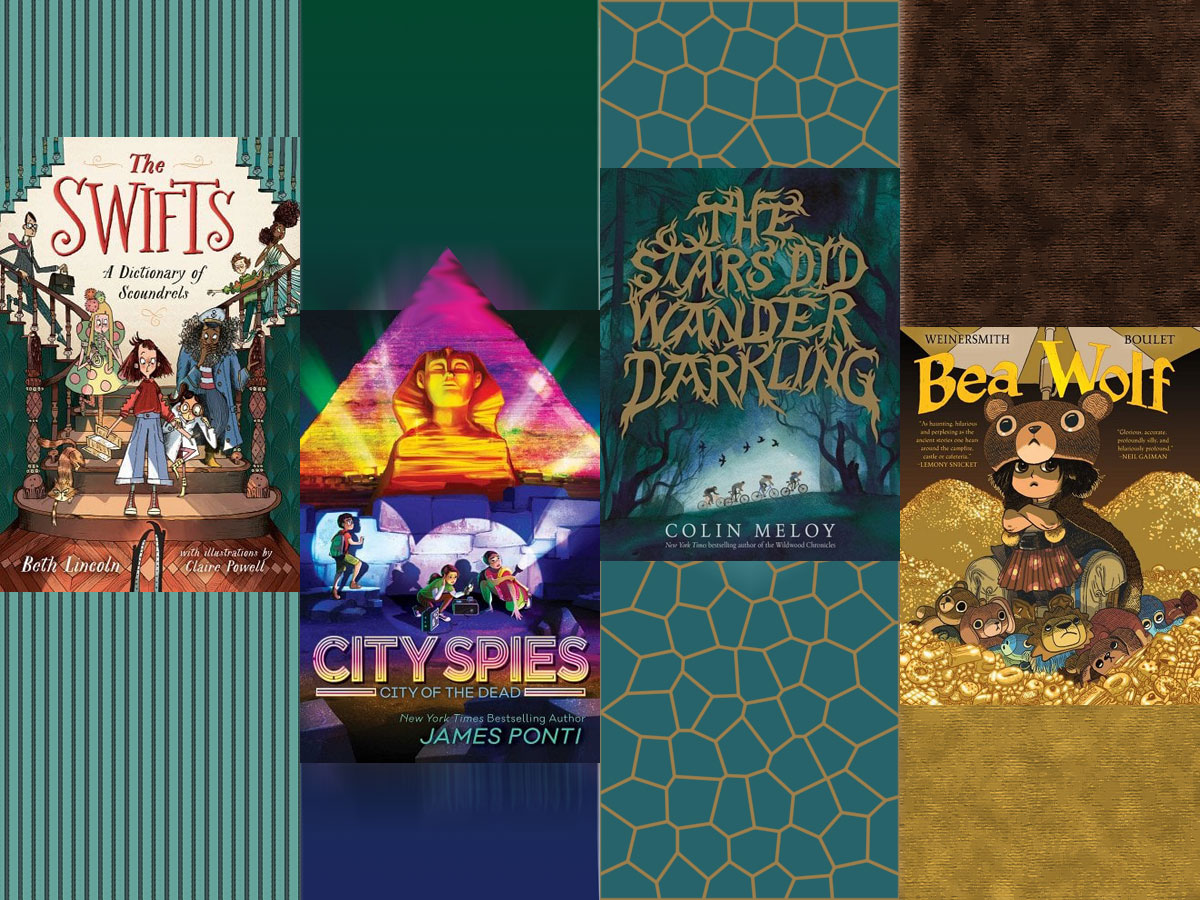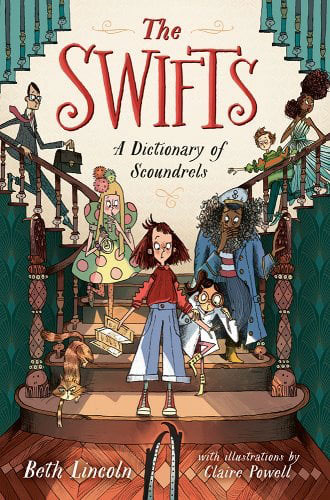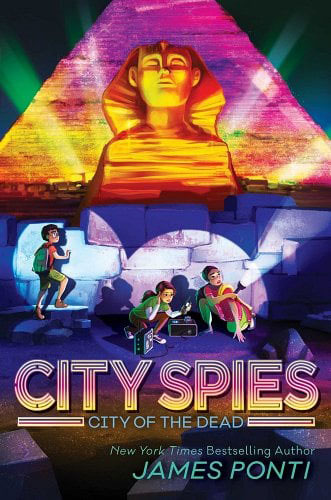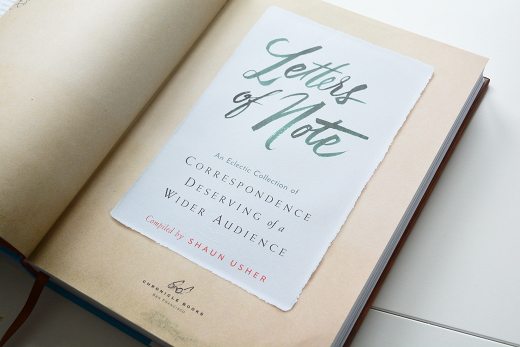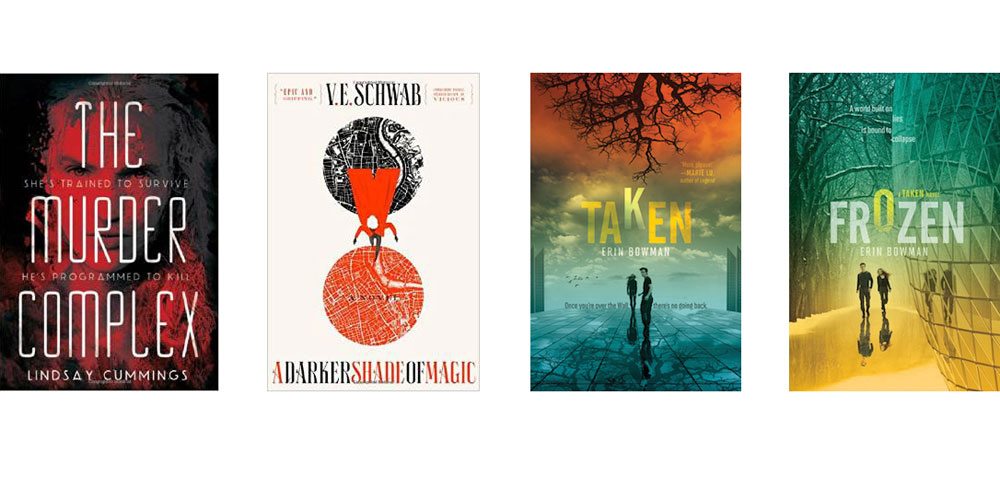Meddling kids are a staple of children’s stories, whether they’re found in books or TV shows or movies. As a kid, at some point you start to realize that grown-ups don’t have all the answers about everything, and these stories reflect that while giving kids the hope that maybe it’s okay because they’ll figure things out themselves. (In some versions of these stories, of course, adults turn out to be completely incompetent, which is perhaps less encouraging.) Today’s stack is all about kids in sticky situations, often saving the day without much help from adults.
The Swifts: A Dictionary of Scoundrels by Beth Lincoln, with illustrations by Claire Powell
If you love wordplay, you’ll be particularly tickled by this murder mystery. The Swift family names its members by randomly choosing a word from the family dictionary, and with the name comes a whole host of expectations about living up to it. The main character, a young girl named Shenanigan Swift, is just starting to consider this question of whether her name is her destiny. As her Arch-Aunt Schadenfreude says whenever she’s caught misbehaving, “you can’t help your name.” But is that true?
The extended family has arrived at the Swift House for its once-a-decade reunion, which is also an opportunity to hunt for the lost Swift fortune, hidden somewhere on the grounds ages ago by the nefarious Vile Swift. But things quickly escalate when Arch-Aunt Schadenfreude is pushed down the stairs—despite what the grown-ups say, Shenanigan and her siblings suspect foul play, and pretty soon the body count begins to rise. Mix a bunch of suspicious characters, a house with lots of secret passages and booby traps, and add in a girl who isn’t afraid to look for trouble, and you get an exciting mystery that keeps you guessing.
Lincoln has a lot of fun with the names, but she’s also good at just throwing in a really fantastic turn of phrase here and there, in a way that reminds me a bit of The Phantom Tollbooth even though The Swifts doesn’t veer quite as far into the fantastical. She also dips into the difference between prescriptive and descriptive grammar, examining the way that words and definitions can change over time. She comes down on the side of descriptive—that is, language and grammar should reflect the way that we use it—and makes a good case for it. It’s something that I hadn’t really learned about myself until much later in life, and it has taken me a long time to move from prescriptive to descriptive—a book like this may have helped me understand that a little sooner! The Swifts is Lincoln’s first novel, and it’s an impressive debut and I look forward to reading more from her in the future.
City Spies: City of the Dead by James Ponti
This is the fourth book in the City Spies series, and it’s one that I’ve really been enjoying. It’s about a team of kid spies working for MI6, but they’re such a secret that even most of the people in MI6 don’t know about them. If you’re not familiar with it already, I recommend skipping this for now and instead starting with my coverage of the first book to avoid spoilers.
At the start of this book, the team has been tasked with breaking into the British Museum to steal some things—they’re not entirely sure why, though they have some suspicions that it’s tied up with some controversy about repatriating some Egyptian artifacts. This operation soon ties into another case, a series of cyberattacks on various British entities, including the museum. The team finds itself working to figure out who’s behind the hacks, and three of their prime suspects are all in Egypt, so they take a trip to Cairo in pursuit.
Meanwhile, there’s a side plot about Robert, one of Mother’s kids, who has now turned up. Mother is overjoyed to have Robert back, but nobody is entirely sure whether he can be trusted—was he sent by Clementine to spy on the team for Umbra? Or is is this really just a happy reunion? Even though there are some parts of the book that are from Robert’s point of view, Ponti does a great job of keeping his true motives ambiguous.
Each of the books focuses on one of the kids and gives them a little more time in the spotlight; in this book, it’s Kat, the girl who is brilliant at finding patterns. She has some anxiety in crowds and has trouble adjusting when things don’t go according to plan, but in this book she gets to be the alpha (the team leader) on some of the missions and learns some new techniques for dealing with her anxiety. I like the way that the books show how the kids address their insecurities or weaknesses, but also includes some of the inevitable friction between them when they disagree. These books are also full of facts about the title city—in this case, there’s a lot to learn about King Tut and the discovery of his tomb, as well as Luxor and its necropolis.
The Stars Did Wander Darkling by Colin Meloy
I mentioned this briefly last week and have since finished reading it. Four kids, fresh out of 8th grade, are ready for a summer camping trip that they’ve been planning for months. They live in Seaham, a small town on the Oregon coast, where things are usually pretty boring—until a cave is found in the cliffside below the old abandoned Langdon mansion. Things start to get weird—you might even call them, uh, stranger things. This book definitely gave me similar vibes as Stranger Things: it’s set in the 1980s, a time when kids might be allowed to be out all day during the summer and it was really hard to reach anyone if they weren’t at home. It’s unclear what’s in the dark cave, but Archie Coomes starts to notice things that unsettle him for some reason: a penny that turns up on his doorstep, an old woman in the middle of the street shouting nonsense at him.
Archie and his friends try to figure out what’s going on, and pretty soon they’re not sure who they can trust. The adults start behaving oddly, including some of their parents. The only adult they can rely on is Randy, the proprietor of the local Beta-only video rental store (“It’s the superior technology”), whose encyclopedic knowledge of horror films turns out to be just the thing the kids need to figure this whole thing out.
This book, even though it’s for kids, is genuinely creepy in some parts, so it’s for kids who like a bit of a fright. I did feel like there were some cliches there: when I started describing the book to my wife, she immediately guessed that there were “three boys, one girl—and she’s not like other girls, right?” One of the kids, Oliver, has seizures with “visions”—and you just know that these aren’t just random hallucinations despite what the doctors say. Still, despite the sense that some of this is retreading familiar ground in some places, I really enjoyed it overall and would recommend it for readers who enjoy Stranger Things and that type of story.
Bea Wolf written by Zach Weinersmith, illustrated by Boulet
You probably wouldn’t have expected a comic book adaptation of Beowulf for kids, but here it is. Zach Weinersmith is known for his webcomic Saturday Morning Breakfast Cereal, but he’s also written some books. One of those was Augie and the Green Knight, an adaptation of the tale of Sir Gawain and the Green Knight that was also illustrated by Boulet.
Beowulf, in case you didn’t know already, is one of the oldest epic poems in Old English, and one of the most famous tales in it is the battle between the hero Beowulf and the monster Grendel, who had broken into a great hall and devoured a bunch of people as they’re sleeping after a feast. Beowulf arrives, wrestles with Grendel, and eventually wins by tearing off his arm. Yeah, not really your typical bedtime story for kids (though I do remember reading a version of it when I was a kid, and I was fascinated by the gruesome illustrations of Grendel munching on people and then losing his arm).
Bea Wolf takes the story and sets it in a treehouse—the king and his band are now kids, feasting on candy and cakes, staying up too late watching TV and playing videogames. Next door lives Grindle, a fastidious man who flosses twice a day and watches cable news, and he can’t stand all the noise. He sneaks up into the treehouse, and his touch turns the kids into adults. He adultifies a bunch of the kids, and tidies up the treehouse so everything is nice and neat and boring. Bea Wolf comes from the north to aid King Roger, challenging Grindle to a battle (which does not end in dismemberment).
The whole thing is written in poem, filled with alliteration, and it’s a celebration of childhood delight and excess, and it’s really fun to read. The enemies are greasy teenagers and boring adults, and the heroes are toddlers and little kids, armed with foam weapons and wearing underwear helmets. The black-and-white illustrations are dynamic and packed with details. As Weinersmith explains in the afterword, this book only adapts about the first third of Beowulf, with just a couple of stories and the battle with Grindle. There’s a bit of a teaser at the end about Grindle’s mother, “a tale for another time.” Based on this volume, I really hope Weinersmith and Boulet are able to team up for more.
My Current Stack
I’ve always got more books featuring kid detectives (and other meddling kids), but right now I’ve just started reading Tomorrow, and Tomorrow, and Tomorrow by Gabrielle Zevin, a novel that several friends had recommended that I picked up for myself. I’ve only gotten a little ways into it, but have found a lot of striking similarities between myself and one of the main characters (he’s in college in Boston in the late ’90s, majoring in math, among other things) so I got a big dose of nostalgia right up front. We’ll see where this goes!
Disclosure: I received review copies of the books covered in this column. Affiliate links to Bookshop.org help support my writing and independent booksellers!
